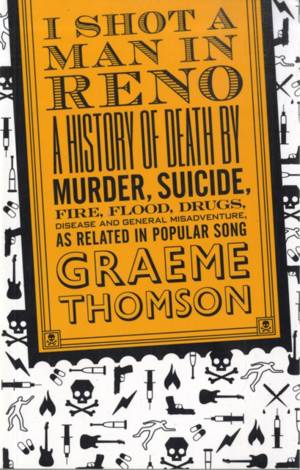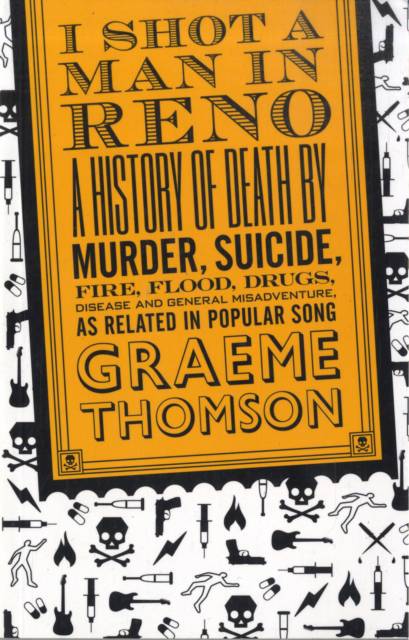
- Retrait gratuit dans votre magasin Club
- 7.000.000 titres dans notre catalogue
- Payer en toute sécurité
- Toujours un magasin près de chez vous
- Retrait gratuit dans votre magasin Club
- 7.000.0000 titres dans notre catalogue
- Payer en toute sécurité
- Toujours un magasin près de chez vous
I Shot a Man in Reno
A History of Death by Murder, Suicide, Fire, Flood, Drugs, Disease and General Misadventure, as Related in Popular Song
Graeme ThomsonDescription
Ask the gangsta rap devotee. Ask the grizzled blues fanatic and the bearded folk fan. Ask the goth and the indie kid. Ask and they will all tell you the same thing: death and popular music have forever danced hand-in-hand in funereal waltz time. The pop charts and the majority of radio stations' playlists may conspire to convince anyone listening that the world spins on its axis to the tune of "I love you, you love me" and traditional matters of the heart. The rest of us know that we live in a world where red roses will one day become lilies and that death is the motor that drives the greatest and most exhilarating music of all.
"Death music" is not merely a byword for bookish solemnity, or the glorification of murder, drugs and guns. Over the course of the last hundred years it has also been about teenage girls weeping over their high school boyfriend's fatal car wreck; natural disasters sweeping whole communities away; the ever-evolving threat of disease; changing attitudes to old age; exhortations to suicide; the perfect playlist for a funeral; and the thorny question of what happens after the fat lady ceases to sing. Which means that for every "Black Angel's Death Song" there is a "Candle in the Wind," and for every "Cop Killer" there is "The Living Years." Death, like music, is a unifying force. There is something for every taste and inclination, from murderous vengeance to camp sentimentality and everything in between. Drawing upon original and unique interviews with artists such as Mick Jagger, Richard Thompson, Ice-T, Will Oldham and Neil Finn among many others, I Shot a Man In Reno explores how popular music deals with death, and how it documents the changing reality of what death means as one grows older. It's as transfixing as a train wreck, and you won't be able to put it down. as an epilogue, I Shot A Man In Reno presents the reader with the 40 greatest death songs of all time, complete with a brief rationale for each, acting as a primer for the morbidly curious listener.Spécifications
Parties prenantes
- Auteur(s) :
- Editeur:
Contenu
- Nombre de pages :
- 272
- Langue:
- Anglais
Caractéristiques
- EAN:
- 9780826428578
- Date de parution :
- 15-08-08
- Format:
- Livre broché
- Format numérique:
- Trade paperback (VS)
- Dimensions :
- 162 mm x 214 mm
- Poids :
- 299 g

Les avis
Nous publions uniquement les avis qui respectent les conditions requises. Consultez nos conditions pour les avis.






